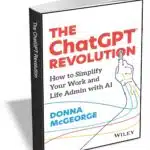87 percent of organizations likely to invest in Gen AI coding tools

A new report from software engineering specialist LinearB looks at the effects of generative AI on code creation and delivery.
Gen AI is predicted to generate one in five lines of code by the end of this year and the study of over 150 tech leaders sets out to understand how organizations can measure the effects of Gen AI on their code.
Privacy fears lead enterprises to ban GenAI use

New research reveals that that most organizations are limiting the use of generative AI over data privacy and security issues, and 27 percent have banned its use, at least temporarily.
The study from Cisco surveyed 2,600 privacy and security professionals and finds that among concerns cited are threats to an organization's legal and Intellectual Property rights (69 percent), and the risk of disclosure of information to the public or competitors (68 percent).
Organizations face devastating financial consequences from cyberattacks

A new report from Barracuda Networks and the Ponemon Institute looks at 'cybernomics' -- the financial forces that are driving cyberattacks.
Based on a survey of over 1,900 IT security practitioners it finds the average annual cost to respond to compromises is a startling $5.34 million.
How to reduce generative AI's risks to data [Q&A]

Generative AI models like ChatGPT are creating a lot of enthusiasm for what they can do for businesses, but they are generating just as much fear over what can go wrong with the data they handle. There is a lack of trust between large companies that have the data and the AI startups that want to use them.
What can we expect to see in the near future? We spoke with Katy Salamati, senior manager of the advanced analytics lifecycle at SAS, to find out.
Predictions for GenAI adoption in 2024

Generative artificial intelligence (GenAI) entered the public consciousness and debate about one year ago. As a science, it goes back several years but as an applicable piece of software, it is very much in its infancy.
Text, images, and audio can be generated by GenAI models,but their integration into existing software tools worldwide is still in its early stages. Similarly, the majority of business leaders are only talking about GenAI, with some experimenting through proofs of concepts, while a small minority have deployed initial, and usually specific, use cases.
How AI is set to transform the legal sector [Q&A]

The use of generative AI is becoming common across many industries, but while it undoubtedly offers benefits it can lead to problems too.
Legal firms in particular can fall foul of poor results, one firm was fined $5,000 after a court found that one of its lawyers had used ChatGPT to write a court brief which included false citations.
Microsoft launches Retail Media Creative Studio to give advertisers the power of generative AI

Microsoft has announced a series of new artificial intelligence tools, options and capabilities which the company is using to empower retailers.
From copilot templates designed to help retailers provide personalized experiences for customers to generative AI tools for creating ads, Microsoft continues to push hard with AI. Of particular interest in the latest batch of tools is Retail Media Creative Studio, currently in preview.
Generative AI use in the workplace leads to added risks

More than 10 percent of enterprise employees access at least one generative AI application every month, compared to just two percent a year ago, but there are security risks as a result.
New research from Netskope shows ChatGPT was the most popular generative AI application in 2023, accounting for seven percent of enterprise usage. The number of cloud apps the enterprise accessed also increased by an average of 19 percent per year, with users jumping from 14 to 20 different apps in just two years.
Why AI Is finally catching up with financial services

Generative AI has the potential to reshape entire industries and how they operate, and financial services stand out as uniquely poised for AI-driven transformation. McKinsey & Company calls generative AI the next frontier for productivity, estimating that analyzing natural language text -- a core generative AI use case -- accounts for an average of 25 percent of the time people spend in any given enterprise.
The finance industry is a data-driven industry, so it’s no surprise that finance sector firms see big potential in using generative AI to tackle use cases that require assessing enormous amounts of unstructured data, such as company due diligence, know-your-customer (KYC) requirements, sustainability research, and controversy monitoring.
Get 'The ChatGPT Revolution: How to Simplify Your Work and Life Admin with AI' (worth $13) for FREE

The ChatGPT Revolution is the ultimate quick-start guide to unlocking the power of AI tool ChatGPT. We’re on the edge of an AI revolution… but what does that mean for you? It’s time to get curious about how the latest tech can help you handle your everyday load, at work and at home!
Whether you’re overwhelmed by repetitive, time-consuming tasks or you’re simply looking for a fresh injection of creativity, ChatGPT is the virtual assistant that’s got your back.
The promise of generative AI depends on precise regulation

AI’s path to maturity lacks footing without the stamp of regulation. While the recent developments of the White House executive order and the EU AI Act are a good start, there’s a lot of progress to be made in terms of AI research and rule-making. Because if we want to unlock the full range of AI use cases, we’re going to need precise regulation, tailored to the unique needs of each sector.
Generative AI sparks an opportunity to transform every industry; a prospect that has prompted a flurry of AI innovation across verticals that will undoubtedly send ripple effects throughout the economy. McKinsey estimates that across 63 different use cases, generative AI could contribute between $2.6 trillion to $4.4 trillion to the global economy annually. But sector and use-case-specific regulatory framework is imperative if we want to harness this potential and ensure responsible, safe applications of generative AI.
Navigating generative AI adoption to minimize risks and maximize benefits in the workplace [Q&A]

Numerous businesses have embraced generative AI technology to enhance their operational efficiency, boost productivity and foster innovative ideas.
However, it is important to be aware of the potential legal and financial consequences associated with the use of ChatGPT and similar AI systems. We spoke to Sujay Rao, CPO at Sirion to find out more.
Generative AI is forcing enterprises -- and policymakers -- to rewrite the rules of cybersecurity

Following a year full of excitement and uncertainty, and more opinions about the future of AI than anyone could count, AI providers, enterprises, and policymakers are now rallying around one thing: AI security.
The White House recently followed in the European Union’s footsteps to introduce a new set of standards for the secure development and deployment of AI models. But while regulators triangulate their policies and AI companies work to comply, the real responsibility to proceed safely will remain with enterprises.
New risks, new opportunities and democratization -- AI predictions for 2024
How AI is weaponized for cyberattacks

A new report from Abnormal Security highlights real-world examples of how AI is being used to carry out cyberattacks.
Generative AI allows scammers to craft unique email content, making detection that relies on matching known malicious text strings infinitely more difficult.
Recent Headlines
Most Commented Stories
BetaNews, your source for breaking tech news, reviews, and in-depth reporting since 1998.
© 1998-2025 BetaNews, Inc. All Rights Reserved. About Us - Privacy Policy - Cookie Policy - Sitemap.
